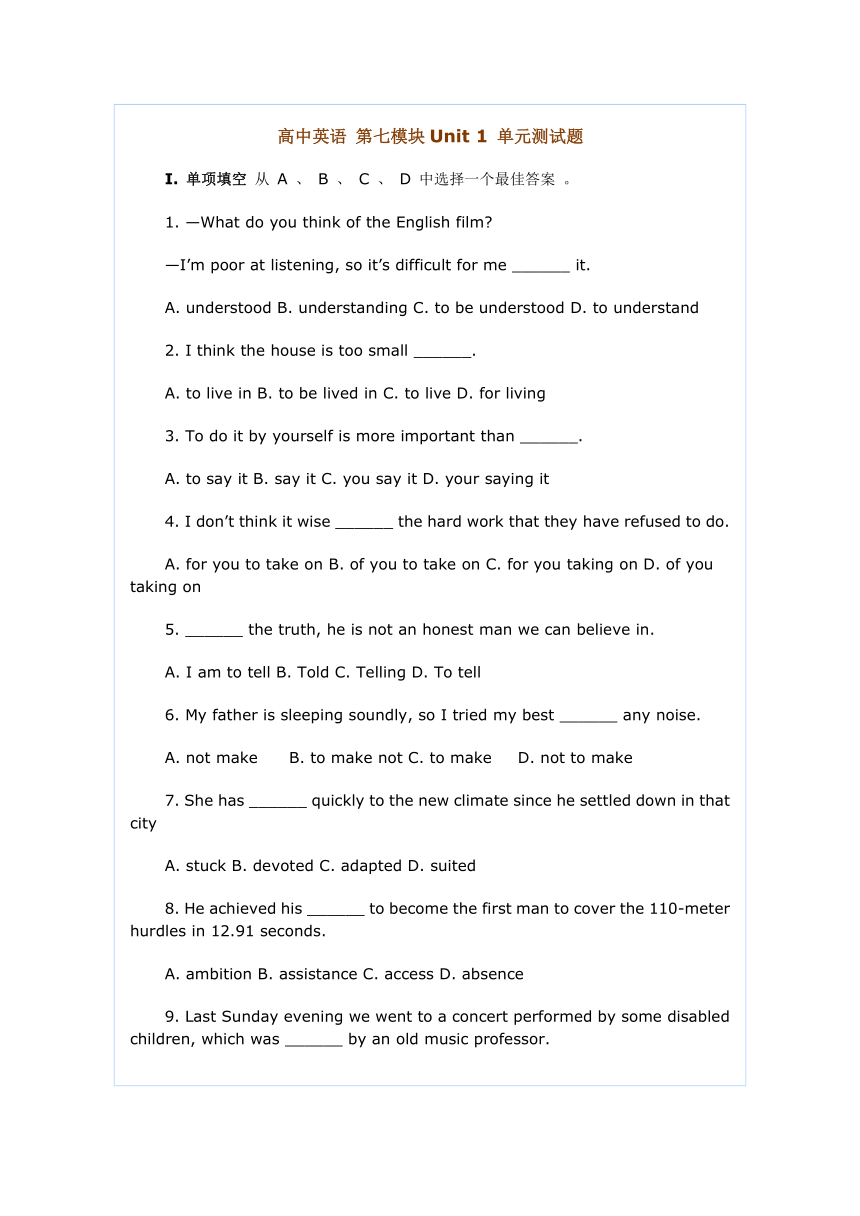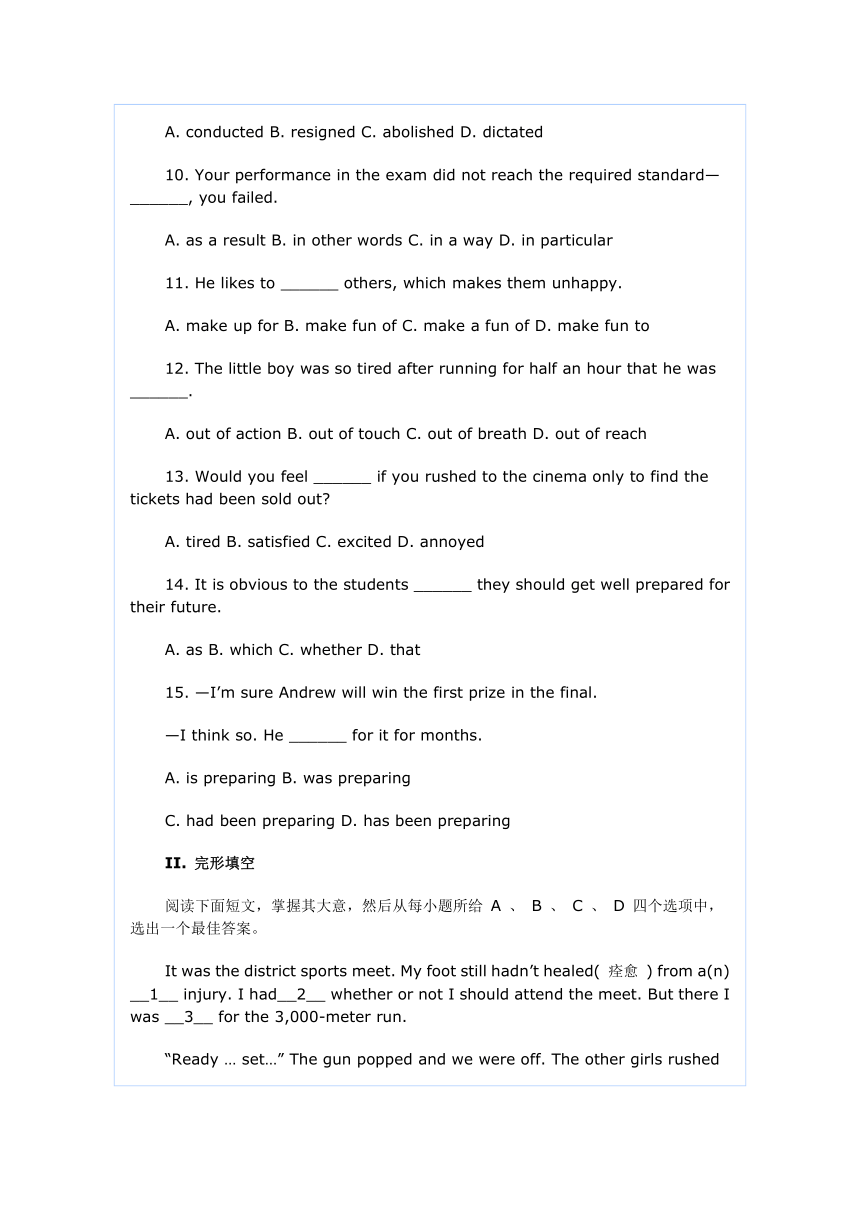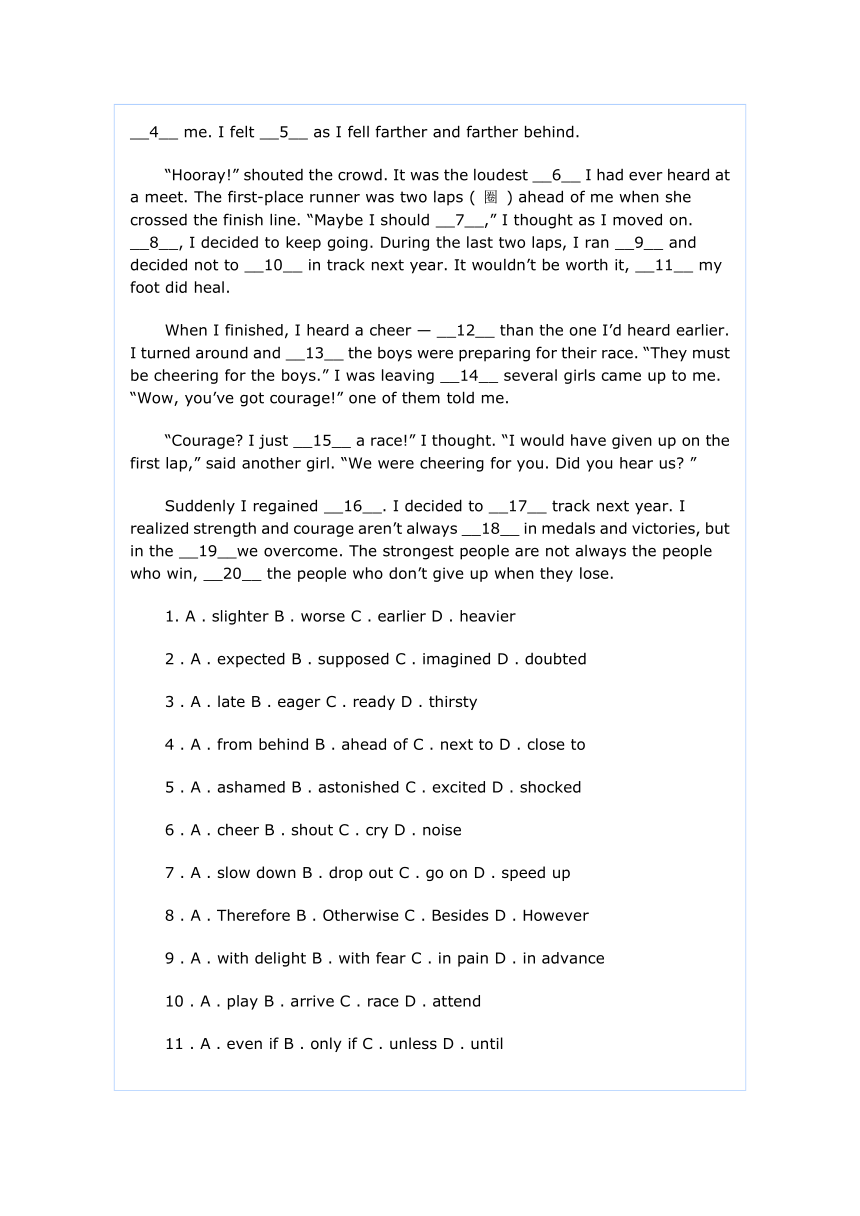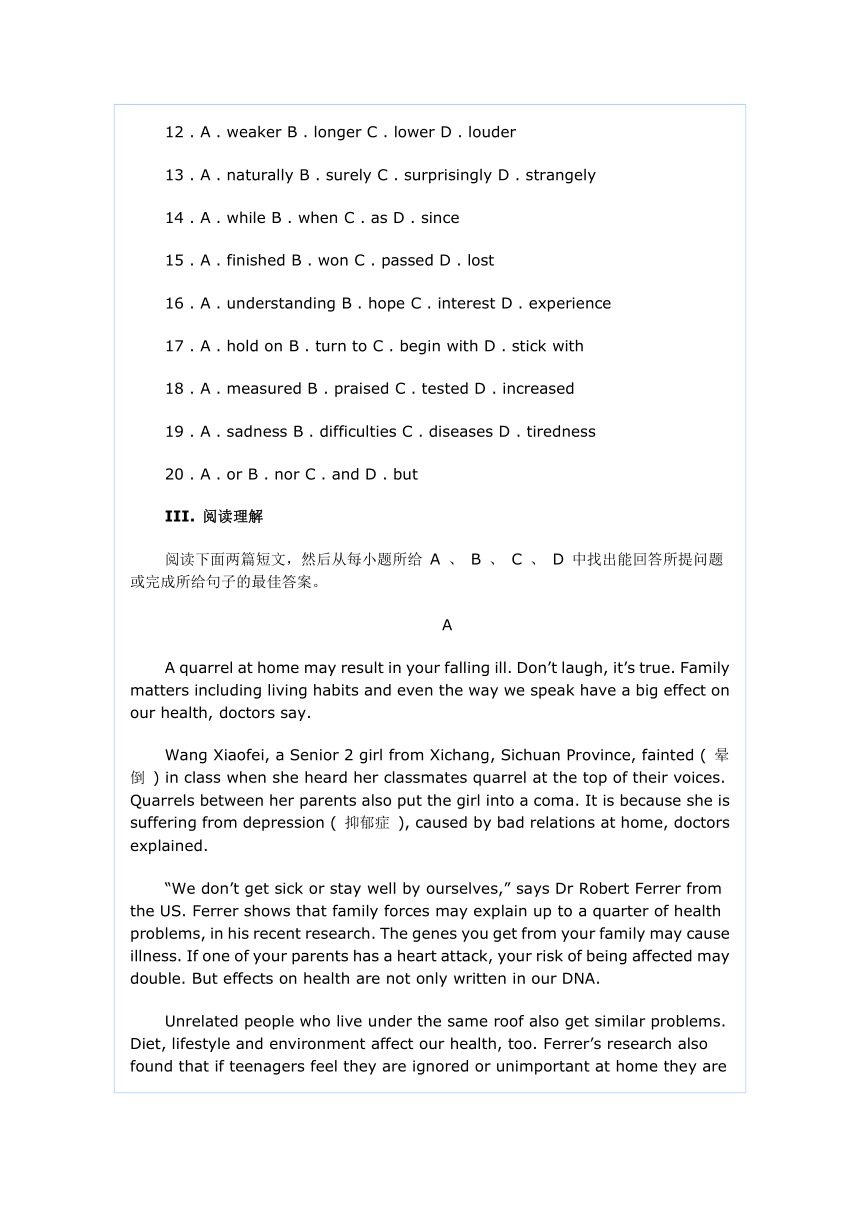Unit 1 Living well 单元测试题
文档属性
| 名称 | Unit 1 Living well 单元测试题 |  | |
| 格式 | zip | ||
| 文件大小 | 48.2KB | ||
| 资源类型 | 教案 | ||
| 版本资源 | 人教版(新课程标准) | ||
| 科目 | 英语 | ||
| 更新时间 | 2012-03-20 12:52:43 | ||
图片预览




文档简介
高中英语 第七模块Unit 1 单元测试题I. 单项填空 从 A 、 B 、 C 、 D 中选择一个最佳答案 。 1. —What do you think of the English film —I’m poor at listening, so it’s difficult for me ______ it. A. understood B. understanding C. to be understood D. to understand 2. I think the house is too small ______. A. to live in B. to be lived in C. to live D. for living 3. To do it by yourself is more important than ______. A. to say it B. say it C. you say it D. your saying it 4. I don’t think it wise ______ the hard work that they have refused to do. A. for you to take on B. of you to take on C. for you taking on D. of you taking on 5. ______ the truth, he is not an honest man we can believe in. A. I am to tell B. Told C. Telling D. To tell 6. My father is sleeping soundly, so I tried my best ______ any noise. A. not make B. to make not C. to make D. not to make 7. She has ______ quickly to the new climate since he settled down in that city A. stuck B. devoted C. adapted D. suited 8. He achieved his ______ to become the first man to cover the 110-meter hurdles in 12.91 seconds. A. ambition B. assistance C. access D. absence 9. Last Sunday evening we went to a concert performed by some disabled children, which was ______ by an old music professor. A. conducted B. resigned C. abolished D. dictated 10. Your performance in the exam did not reach the required standard— ______, you failed. A. as a result B. in other words C. in a way D. in particular 11. He likes to ______ others, which makes them unhappy. A. make up for B. make fun of C. make a fun of D. make fun to 12. The little boy was so tired after running for half an hour that he was ______. A. out of action B. out of touch C. out of breath D. out of reach 13. Would you feel ______ if you rushed to the cinema only to find the tickets had been sold out A. tired B. satisfied C. excited D. annoyed 14. It is obvious to the students ______ they should get well prepared for their future. A. as B. which C. whether D. that 15. —I’m sure Andrew will win the first prize in the final. —I think so. He ______ for it for months. A. is preparing B. was preparing C. had been preparing D. has been preparing II. 完形填空阅读下面短文,掌握其大意,然后从每小题所给 A 、 B 、 C 、 D 四个选项中,选出一个最佳答案。 It was the district sports meet. My foot still hadn’t healed( 痊愈 ) from a(n) __1__ injury. I had__2__ whether or not I should attend the meet. But there I was __3__ for the 3,000-meter run. “Ready … set…” The gun popped and we were off. The other girls rushed __4__ me. I felt __5__ as I fell farther and farther behind. “Hooray!” shouted the crowd. It was the loudest __6__ I had ever heard at a meet. The first-place runner was two laps ( 圈 ) ahead of me when she crossed the finish line. “Maybe I should __7__,” I thought as I moved on. __8__, I decided to keep going. During the last two laps, I ran __9__ and decided not to __10__ in track next year. It wouldn’t be worth it, __11__ my foot did heal. When I finished, I heard a cheer — __12__ than the one I’d heard earlier. I turned around and __13__ the boys were preparing for their race. “They must be cheering for the boys.” I was leaving __14__ several girls came up to me. “Wow, you’ve got courage!” one of them told me. “Courage I just __15__ a race!” I thought. “I would have given up on the first lap,” said another girl. “We were cheering for you. Did you hear us ” Suddenly I regained __16__. I decided to __17__ track next year. I realized strength and courage aren’t always __18__ in medals and victories, but in the __19__we overcome. The strongest people are not always the people who win, __20__ the people who don’t give up when they lose. 1. A . slighter B . worse C . earlier D . heavier 2 . A . expected B . supposed C . imagined D . doubted 3 . A . late B . eager C . ready D . thirsty 4 . A . from behind B . ahead of C . next to D . close to 5 . A . ashamed B . astonished C . excited D . shocked 6 . A . cheer B . shout C . cry D . noise 7 . A . slow down B . drop out C . go on D . speed up 8 . A . Therefore B . Otherwise C . Besides D . However 9 . A . with delight B . with fear C . in pain D . in advance 10 . A . play B . arrive C . race D . attend 11 . A . even if B . only if C . unless D . until 12 . A . weaker B . longer C . lower D . louder 13 . A . naturally B . surely C . surprisingly D . strangely 14 . A . while B . when C . as D . since 15 . A . finished B . won C . passed D . lost 16 . A . understanding B . hope C . interest D . experience 17 . A . hold on B . turn to C . begin with D . stick with 18 . A . measured B . praised C . tested D . increased 19 . A . sadness B . difficulties C . diseases D . tiredness 20 . A . or B . nor C . and D . but III. 阅读理解阅读下面两篇短文,然后从每小题所给 A 、 B 、 C 、 D 中找出能回答所提问题或完成所给句子的最佳答案。 A A quarrel at home may result in your falling ill. Don’t laugh, it’s true. Family matters including living habits and even the way we speak have a big effect on our health, doctors say. Wang Xiaofei, a Senior 2 girl from Xichang, Sichuan Province, fainted ( 晕倒 ) in class when she heard her classmates quarrel at the top of their voices. Quarrels between her parents also put the girl into a coma. It is because she is suffering from depression ( 抑郁症 ), caused by bad relations at home, doctors explained. “We don’t get sick or stay well by ourselves,” says Dr Robert Ferrer from the US. Ferrer shows that family forces may explain up to a quarter of health problems, in his recent research. The genes you get from your family may cause illness. If one of your parents has a heart attack, your risk of being affected may double. But effects on health are not only written in our DNA. Unrelated people who live under the same roof also get similar problems. Diet, lifestyle and environment affect our health, too. Ferrer’s research also found that if teenagers feel they are ignored or unimportant at home they are more likely to get sick. We may never fully understand all the effects that families have on our health. But just as individual ( 个别的 ) problems can have effects on others, a small improvement can have big benefits, Ferrer said. 1. Why did Wang Xiaofei faint in class A. Because of her depression caused by bad family relations. B. Because her classmates often quarreled in class. C. Because her classmates shouted loudly at her. D. Because her parents were strict with her. 2. According to Dr Ferrer, which of the following statements is true A. We get sick or stay well by ourselves. B. Our health has nothing to do with diet, lifestyle and environment. C. Only the genes we get from our family have a big effect on our health. D. Teenagers who are ignored at home get sick more easily than those who are not. 3. The underlined word “ coma” probably means “_______”. A. embarrassment B. faint C. tiredness D. sadness 4. The best title for this passage is _______. A. Family Relations B. The Reasons Why We Get Sick C. Family Relations Affect Your Health D. A Research about Teenagers’ Health B Learning disabilities are very common. They affect perhaps 10 percent of all children. Four times as many boys as girls have learning disabilities. Since about 1970, new research has helped brain scientists understand these problems better. Scientists now know there are many different kinds of learning disabilities and that they are caused by many different things. There is no longer any question that all learning disabilities result from differences in the way the brain is organized. You cannot look at a child and tell if he has a learning disability. There is no outward sign of the disorder. So some researchers began looking at the brain itself to learn what might be wrong. In one study, researchers examined the brain of a learning-disabled person, who had died in an accident. They found two unusual things. One involved cells in the left side of the brain, which control language. These cells normally are white. In the learning disabled person, however, these cells were gray. The researchers also found that many of the nerve cells were not in a line the way they should have been. The nerve cells were mixed together. The study was carried out under the guidance of Norman Geschwind, an early expert on learning disabilities. Doctor Geschwind proposed that learning disabilities resulted mainly from problems in the left side of the brain. He believed this side of the brain failed to develop normally. Probably, he said, nerve cells there did not connect as they should. So the brain was like an electrical device in which the wires were crossed. Other researchers did not examine brain tissue. Instead, they measured the brain’s electrical activity and made a map of the electrical signals. Frank Duffy experimented with this technique at Children’s Hospital Medical Center in Boston. Doctor Duffy found large differences in the brain activity of normal children and those with reading problems. The differences appeared throughout the brain. Doctor Duffy said his research is evidence that reading disabilities involve damage to a wide area of the brain, not just the left side. 5. The brain cells of a learning-disabled person differ from those of a normal person in _______. A. structure and function B. color and function C. size and arrangement D. color and arrangement 6. Which of the following is NOT mentioned in the passage A. Learning disabilities may result from the unknown area of the brain. B. Learning disabilities may result from damage to a wide area of the brain. C. Learning disabilities may result from abnormal organization of brain cells. D. Learning disabilities may result from problems in the left side of the brain. 7. All of the following statements are true EXCEPT that _______. A. many factors account for learning disorder B. a learning disabled person shows no outward signs C. reading disabilities are a common problem that affects 10 percent of the population D. the brain activity of learning disabled children is different from that of normal children 8. Doctor Duffy believed that the problem of learning disabilities _______. A. were caused by some body disabilities B. was not limited to the left side of the brain C. resulted from the left side of the brain D. did not lie in the left side of the brain IV. 书面表达假设你是李华,要给英国笔友 Harry 写封信,介绍你们新学期开学后为灾区捐款的事情。请按下图顺序描述。 词数不少于 60 。 ( 跳蚤市场 flea market) Dear Harry, How are things going _________________________________________________________________________________ _________________________________________________________________________________ _________________________________________________________________________________ _________________________________________________________________________________ Best wishes, Li Hua 答案 : I. 单项填空 : (1—15) DAABD DCAAB BCDDD II. 完形填空 : (1—10) CDCBA ABDCC (11—20) ADBBD BDABD III. 阅读理解 : (1—4) ADBC (5—8) DACB IV. 书面表达: Dear Harry, How are things going As you know, serious snow storms hit southern China several days before Spring Festival, which caused great damages to people’s lives. On the first school day we had a discussion about how to help the people in the disaster-stricken areas. At last, we had a good idea. A flea market was held in the school yard to raise money the following day. Quite a lot of students took part in it and some money was contributed. We just wanted to express our great concerns, and hoped the victims could beat the storms earlier. Best wishes, Li Hua
